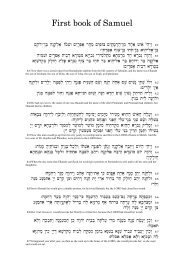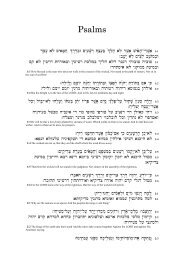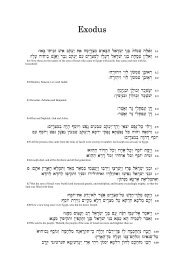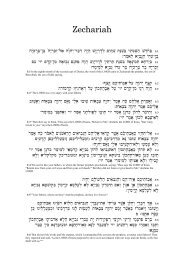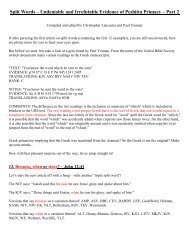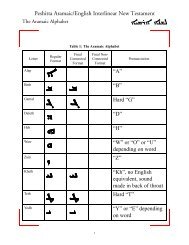ana translation
Untitled - Peshitta Aramaic/English Interlinear New Testament
Untitled - Peshitta Aramaic/English Interlinear New Testament
- No tags were found...
Create successful ePaper yourself
Turn your PDF publications into a flip-book with our unique Google optimized e-Paper software.
98 SUPPLEMENTAL NOTES. [2 PET. i. 4<br />
most of our earlier group, and also the new witness 20 ;<br />
as well as<br />
18 and 19, which, though transcripts recently made, apparently present<br />
an early text.<br />
(a) The first of these errors lljOQJi (= eViyvoxms) for V?OQ*<br />
(= iTrayyeXfjLa.ro)<br />
was rectified in P (the Paris Polyglot of 1645), presumably<br />
on the authority of a codex in the hands of the editor, Gabriel<br />
Sionita, and in A (that of London, Walton's of 1657, which closely<br />
reproduces the Paris text).<br />
Yet it holds its ground in the European<br />
editions, even L (Lee's, 1816 the Buch<strong>ana</strong>n codex (9)<br />
which he used<br />
being here hardly legible).<br />
In N (the American edition, New York,<br />
1886) it is corrected after the Williams codex (11).<br />
The resemblance<br />
between the two words in Greek is but slight and remote ;<br />
in Syriac<br />
it is<br />
very close. Thus the corruption is to be ascribed to the Syriac.<br />
But it must have been an early one, for the Arabic version from the<br />
Syriac (of Cent, ix or x) has adopted it. The emendation J^jooii<br />
is attested by all our earlier group (except 9, which is doubtful),<br />
and also by 18, 19, 20, as well as by 11, and the text which P represents,<br />
against the later group, and the text from which Etzel derived<br />
his Latin version.<br />
Here Hkl. supports our emended text, but in such wise as to exclude<br />
the supposition that the pJOoi of the authorities for that text may<br />
have been a correction borrowed from it ;<br />
for in rendering eTrayyeX/xara<br />
it<br />
employs a different though equivalent word, ]i^ \r>^> Note that<br />
this latter rendering is used in our version, iii. 13 infr. ;<br />
and also iii. 4, 9<br />
(=7rayyeAi'a). In these three places Hkl. prefers |^)OQ* ;<br />
so that in<br />
their use of these two words the two versions agree in no instance,<br />
nor is either consistent in itself.<br />
They agree however in rendering<br />
eTrayyeAAo/xei/oi by _j5oA*Lo (ii.<br />
19, infr.).<br />
(b) The second error ]*;QA]O (= /cat ri/nas) for ]'," i O iO (= /ecu rt/xta)<br />
stands in all editions before the present.<br />
In this instance the correction<br />
though less strongly is sufficiently attested,<br />
by 9, 12, 14, being the<br />
majority of our earlier group (though not by 1 or 2), with 19 and 20,<br />
and (apparently) 18 also ; by Etzel's text, though not by that of the<br />
Arabic translator nor that of the Paris editor. Here the evidence of 1,<br />
our primary authority, needs to be fully stated j<br />
for a mere copyist's error<br />
in it, erroneously corrected, seems to have introduced the misreading.<br />
The scribe apparently first wrote Ir^jO (or fcOiO), which would= 6Ao-<br />
(or w/xara), for which compare Mark xii. 33 (Peeh.)<br />
; a later



